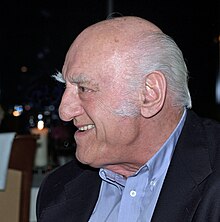Jerzy Kawalerowicz
Jerzy Kawalerowicz (born January 19, 1922 in Gwoździec , today Ukraine , † December 27, 2007 in Warsaw ) was a Polish film director , screenwriter and film producer . He was married to actress Lucyna Winnicka .
Life
Jerzy Kawalerowicz was Wanda Jakubowska's assistant director in 1947 for her film Holocaust drama The Last Stage . From 1947 to 1949 he studied at the Academy of Fine Arts in Cracow . He began making films himself in the early 1950s and became a representative of existentialism in Polish cinema in the 1950s and 1960s. An outstanding example of this is his film Nachtzug from 1959 with Zbigniew Cybulski and Leon Niemczyk in the leading roles. In 1955 Kawalerowicz founded the Kadr film studio , which he has since headed as artistic director and which has produced all of his films as well as films by other important Polish directors such as Andrzej Wajda , Andrzej Munk and Kazimierz Kutz .
His literary adaptations were also among the legendary films in Polish and international cinema. In 1961 he filmed a novel by Jarosław Iwaszkiewicz with his mother Johanna von den Engeln (the film was awarded the special jury prize at the Cannes Film Festival in 1961 ) and in 1966 with Pharaoh, a novel by Bolesław Prus , which was at the same time Poland's most expensive monumental film . Kawalerowicz's film received an Oscar nomination for Best Foreign Language Film . At the 1978 Berlinale , Kawalerowicz was awarded the Silver Bear for his film The Death of the President and for his life's work.
From 1985 to 1989 Kawalerowicz was a member of the Sejm , from 1986 to 1990 he was also a member of the National Cultural Council.
In 2001, Kawalerowicz filmed the novel Quo Vadis by Polish Nobel Prize winner Henryk Sienkiewicz as an elaborate large-scale production. The world premiere took place in the presence of Pope John Paul II in the Vatican .
Honors
Jerzy Kawalerowicz received honorary doctorates from both the State University of Film, Television and Theater Łódź and the Sorbonne .
Filmography

- 1952: Gromada
- 1954: One Man's Way / Under the Phrygian Star ( Pod gwiazdą frygijską )
- 1956: The Shadow ( Cień )
- 1957: The real end of the great war ( Prawdziwy koniec wielkiej wojny )
- 1959: Night train ( Pociąg )
- 1961: Mother Johanna von der Engeln ( Matka Joanna od Aniołów )
- 1966: Pharaoh ( Faraon )
- 1968: Gra
- 1971: Maddalena
- 1977: Śmierć prezydenta
- 1980: Spotkanie na Atlantyku
- 1983: Austeria - The house on the border ( Austeria )
- 1989: The Prisoner of Sankt Helena ( Jeniec Europy )
- 1991: Bronstein's children
- 1996: Za co?
- 2001: Quo vadis?
literature
- Konrad Klejsa, Schamma Schahadat, Margarete Wach (eds.): The Polish Film. From its beginnings to the present. Schüren, Marburg 2012, ISBN 978-3-89472-748-2 .
- Christian Kampkötter, Peter Klimczak, Christer Petersen (eds.): Classics of Polish film . Schüren, Marburg 2015, ISBN 978-3-89472-886-1 .
Web links
- Literature by and about Jerzy Kawalerowicz in the catalog of the German National Library
- Jerzy Kawalerowicz in the Internet Movie Database (English)
- Jerzy Kawalerowicz is dead in Spiegel Online , December 28, 2007
Footnotes
- ↑ Ruth Scodel, Anja Bettenworth: Whither Quo Vadis? Sienkiewicz's Novel in Film and Television . Wiley, New York 2008, ISBN 978-1-405-18385-7 .
| personal data | |
|---|---|
| SURNAME | Kawalerowicz, Jerzy |
| BRIEF DESCRIPTION | Polish film director and politician, member of the Sejm |
| DATE OF BIRTH | January 19, 1922 |
| PLACE OF BIRTH | Gwoździec |
| DATE OF DEATH | December 27, 2007 |
| Place of death | Warsaw |
